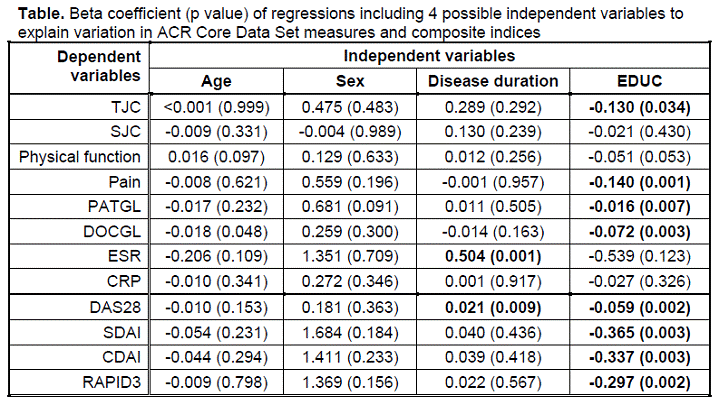Session Information
Session Type: Abstract Submissions (ACR)
Background/Purpose: Poor health is associated with low socioeconomic status (SES), with higher prevalence, greater severity and earlier mortality of many diseases, including rheumatoid arthritis (RA). However, a variable describing SES is not included in many clinical research reports, in contrast to age, sex and duration of disease, which are almost always included as potential confounders of differences between patients in clinical status, treatment responses and outcomes. The most easily measured SES variable is formal education level (EDUC), which has been interpreted as an available surrogate for patient actions and attitudes that may affect health. We analyzed the possible significance of EDUC, age, sex and duration of disease to explain variation in RA Core Data Set variables and 4 RA indices, in a cohort of Korean RA patients seen in usual care.
Methods: MDHAQ and all 7 RA Core Data Set measures were collected in 397 consecutive patients with RA seen in a Korean setting by 4 rheumatologists. Patients were classified in 3 EDUC categories: <7 years (elementary school, n=76; mean age 62.9 years), 7-12 years (high school, n=228; mean age 55.8), and >12 years (college, n=93; mean age 42.9). Possible associations with EDUC were analyzed for each of the 7 RA Core Data Set measures and 4 RA indices: DAS28, SDAI, CDAI and RAPID3 [an index of only the 3 patient self-report Core Data Set measures found on an MDHAQ: physical function, pain and patient global estimate of status (PATGL)]. The data were analyzed by multivariate generalized linear model (GLM) with a log link, and a Poisson distribution was applied to examine difference in 7 Core Data Set measures among EDUC, adjusted for age, sex and disease duration, and by regressions for each Core Data Set variable, with EDUC, age, sex and disease duration as independent variables.
Results: Patients with lower EDUC had higher scores, indicating greater severity, for all Core Data Set measures, statistically significant for tender joint count (TJC), physical function, pain, PATGL and ESR, and all 4 indices – DAS28, SDAI, CDAI and RAPID3 – adjusted for age, sex and disease duration (p <0.01; data not shown). No significant differences were seen for swollen joint count (SJC), physician global estimate (DOCGL) or CRP. In a series of regressions, EDUC was the only significant variable to explain variation in TJC, pain, PATGL, DOCGL, SDAI, CDAI and RAPID3. EDUC and disease duration explained variation in DAS28 significantly, and only disease duration explained variation in ESR. None of the 4 independent variables was significant to explain variation in SJC, physical function, or CRP.
 Conclusion: Significant associations of low EDUC with greater disease severity according to most RA Core Data Set measures and 4 indices were seen in 397 Korean RA patients. EDUC was more likely than age, sex or duration of disease to explain variation in most Core Data Set measures and RA indices. EDUC should be included in all clinical databases.
Conclusion: Significant associations of low EDUC with greater disease severity according to most RA Core Data Set measures and 4 indices were seen in 397 Korean RA patients. EDUC was more likely than age, sex or duration of disease to explain variation in most Core Data Set measures and RA indices. EDUC should be included in all clinical databases.
Disclosure:
S. H. Park,
None;
I. Castrejón,
None;
J. Y. Choe,
None;
S. K. Kim,
None;
H. Lee,
None;
S. G. Kwak,
None;
T. Pincus,
None.
« Back to 2013 ACR/ARHP Annual Meeting
ACR Meeting Abstracts - https://acrabstracts.org/abstract/formal-education-level-explains-variation-in-rheumatoid-arthritis-ra-core-data-set-measures-and-indices-in-korean-patients-at-higher-levels-of-significance-than-age-sex-and-duration-of-disease/
